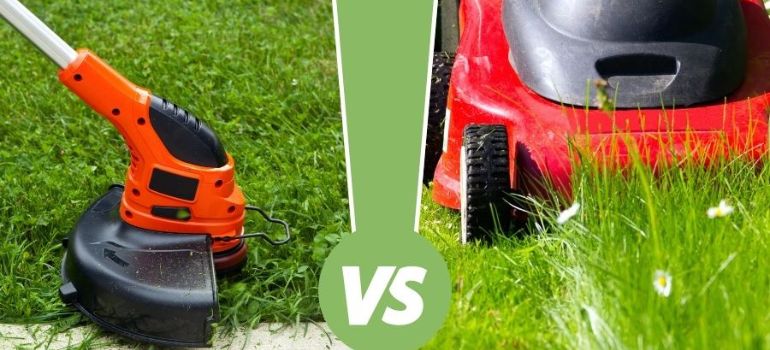In the quest for a well-manicured lawn, homeowners often face the dilemma of choosing between a lawn mower and a weed wacker. These two gardening tools have their unique characteristics, benefits, and applications. This article will provide an in-depth comparison of lawn mowers and weed wackers, helping you make an informed decision regarding your lawn care needs.
Introduction
A well-maintained lawn not only enhances the curb appeal of your property but also offers a space for relaxation and outdoor activities. To achieve that picturesque lawn, you need the right tools for the job. The primary contenders in the realm of lawn maintenance are the lawn mower and the weed wacker.
Purpose of Lawn Maintenance
Before delving into the specifics, let’s understand the importance of lawn maintenance. Regular lawn care ensures the health and aesthetics of your grassy terrain. It involves activities like cutting the grass, trimming edges, and removing unwanted vegetation. The choice between a lawn mower and a weed wacker depends on the nature of these tasks.
The Lawn Mower: A Closer Look
Types of Lawn Mowers
Lawn mowers come in various types, including push mowers, self-propelled mowers, and riding mowers. Each type is designed for specific lawn sizes and terrains.
Advantages of Using a Lawn Mower
Lawn mowers are the go-to choice for large, open lawns. They provide an even, well-groomed finish and are ideal for maintaining grass at a consistent height.
The Weed Wacker: A Detailed Overview
Types of Weed Wackers
Weed wackers, or string trimmers, can be categorized as gas-powered, electric, or battery-operated. They are versatile tools designed for precision trimming and edging.

Advantages of Using a Weed Wacker
Weed wackers excel at reaching tight spaces, such as along fences and borders. They offer precise control and are perfect for maintaining the finer details of your lawn.
Key Differences between Lawn Mowers and Weed Wackers
Cutting Mechanism
Lawn mowers use rotating blades to cut grass evenly across a wide area. In contrast, weed wackers use a rapidly spinning nylon string to trim grass and weeds.
Grass Height Control
Lawn mowers allow you to adjust the cutting height, offering a more uniform appearance. Weed wackers, on the other hand, are better suited for fine-tuning grass height and trimming hard-to-reach areas.
Versatility
Weed wackers are versatile tools capable of both trimming and edging, while lawn mowers are primarily designed for mowing large expanses of grass.
Size and Portability
Lawn mowers are larger and less portable, whereas weed wackers are lightweight and maneuverable, making them suitable for smaller lawns.
Environmental Impact
Weed wackers are often considered more eco-friendly due to their lower fuel consumption and emissions compared to some gas-powered lawn mowers.
Factors to Consider When Choosing Between the Two
Several factors should influence your choice between a lawn mower and a weed wacker:
Lawn Size and Terrain
The size and terrain of your lawn are critical. Larger, flat lawns typically benefit from a lawn mower, while smaller or uneven lawns may require a weed wacker’s precision.
Personal Preferences
Consider your comfort and familiarity with the equipment. Some people prefer the ease of use of a lawn mower, while others appreciate the maneuverability of a weed wacker.
Budget
Lawn mowers come in a range of prices, with riding mowers being more expensive. Weed wackers are generally more affordable.
Maintenance and Safety
Think about the maintenance requirements and safety precautions associated with each tool. Lawn mowers may require more maintenance, while weed wackers are generally easier to maintain.
Lawn Mower vs. Weed Wacker: Pros and Cons
Lawn Mower Pros
- Ideal for large lawns
- Consistent, even cutting
- Adjustable cutting height
- Suitable for different grass types
Lawn Mower Cons
- Less maneuverable
- Larger storage space needed
- Higher maintenance requirements
- Environmental impact (gas-powered models)
Weed Wacker Pros
- Precision trimming and edging
- Lightweight and portable
- Ideal for small or uneven lawns
- Eco-friendly options available (electric or battery-powered)
Weed Wacker Cons
- Not suitable for large lawns
- May require more frequent refueling (gas-powered models)
- Less suitable for regular grass mowing
A Real-World Scenario
Let’s consider a real-world scenario to illustrate the choice. If you have a spacious, flat lawn with minimal obstacles, a self-propelled or riding lawn mower might be the best fit. On the other hand, if your lawn has tight corners, obstacles, and requires precise edging, a weed wacker will likely be more effective.
Tips for Effective Lawn Maintenance
Regardless of your choice, here are some general tips for effective lawn maintenance:
- Regularly sharpen blades or strings for a clean cut.
- Follow a pattern while mowing for an organized appearance.
- Clean the equipment after each use to prevent debris buildup.
- Wear appropriate safety gear, such as goggles and ear protection.
Conclusion
In the battle of the lawn mower vs. weed wacker, there’s no one-size-fits-all answer. Your decision should be based on your lawn’s specific needs and your personal preferences. Both tools have their advantages, and the right choice will lead to a beautifully maintained lawn.
FAQs
Can I use a weed wacker on a large lawn?
While it’s possible, it’s not the most efficient choice for extensive, open lawns. Lawn mowers are better suited for such areas.
Are battery-operated weed wackers powerful enough for tough tasks?
Yes, modern battery-operated weed wackers offer sufficient power for most residential lawn maintenance needs.
Do weed wackers require a lot of maintenance?
Weed wackers are generally easier to maintain than lawn mowers, as they have fewer moving parts.
Which is more eco-friendly, a gas-powered lawn mower or a gas-powered weed wacker?
Gas-powered weed wackers tend to be more eco-friendly due to their lower fuel consumption and emissions.
What’s the best time of day to mow or trim the lawn?
Mowing or trimming during the cooler morning or late afternoon hours is generally recommended to prevent stress on the grass.
